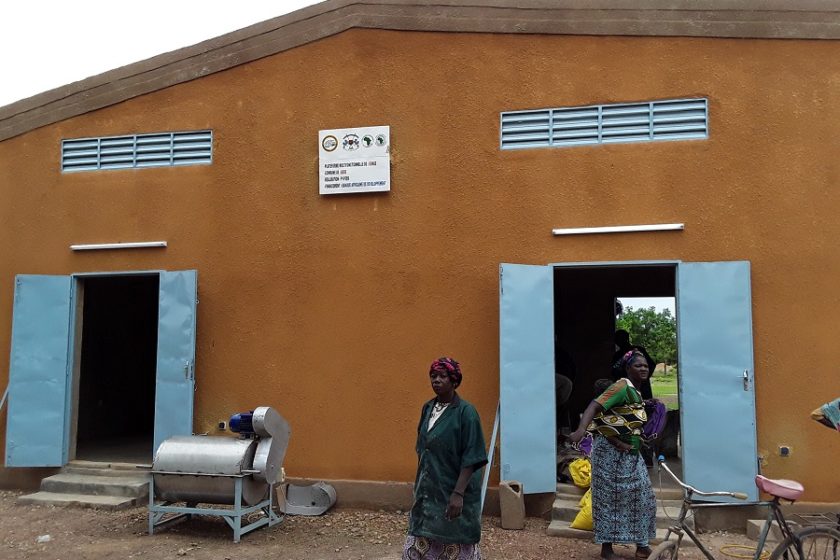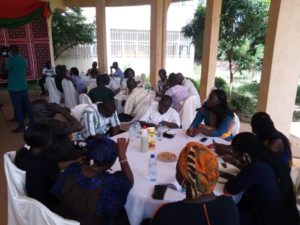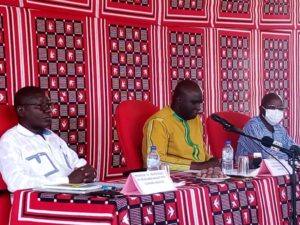A press lunch based on local dishes was organized on Monday, October 26, 2020 in Ouagadougou, on reforms relating to the improvement of the business climate in the agricultural sector. During this press lunch held at the General Directorate for the Promotion of the Rural Economy (DGPER), the Minister of Agriculture and hydro-agricultural development, Salifou Ouédraogo, reviewed various actions carried out.
Fulfill the duty of accountability for actions taken to improve the business climate in the agricultural sector. That’s the whole point of this lunch with the men and women of the media. During this press lunch, the Minister reviewed the actions implemented for the development of the agricultural sector. Five fundamental points have been retained, and concern the agricultural investment code, agricultural insurance, the agricultural development fund, contract farming and post-harvest infrastructure.
The agricultural investment code aims to create an incentive environment for the development of agro-sylvo-pastoral, halieutic and wildlife activities contributing to the economic and social development of Burkina Faso. It should therefore make it possible to facilitate the monitoring and formalization of agricultural enterprises and to provide promoters of agricultural enterprises with legal means to justify their status to the customs and tax services in order to benefit from the incentive advantages. In the opinion of the Minister of Agriculture and Hydro-agricultural Development, Salifou Ouédraogo, the agricultural investment code plays a multi-role. « The code of agro-sylvo-pastoral, halieutic and wildlife investments constitutes for us an instrument for promoting entrepreneurship in the agro-sylvo-pastoral field, fish and wildlife; creation of decent jobs; modernization of production, conservation or processing techniques ”, he made clear.
Agricultural insurance, for its part, must protect the producer, insure him against the risk of loss of his harvest following a lack of rain or pockets of drought. The agricultural insurance mechanism is in its pilot phase; this pilot phase should last three years (2020-2022), with three pilot crops (maize, sorghum and rainfed rice) in three regions (Center-West, Boucle du Mouhoun and East). The beneficiaries of this agricultural insurance can be natural or legal persons and the insurance premium is payable per hectare; the state only pays half. “The subscribers are natural or legal persons (cooperatives, associations)”, he said before adding, “the insurance premium is 12,387 F CFA including tax per hectare of corn; the state pays half by subsidy (50%) and the producer pays the other half, ie 6,194 FCFA / hectare ”. A maximum sum of 130,000 CFA francs per hectare of maize in the event of total loss is also provided for.
Regarding the Agricultural Development Fund (FDA), it exists within the agricultural bank of Faso in the form of a window to facilitate access to credit for producers. « The purpose of the FDA is to grant credits intended to finance the acquisition of agricultural materials and equipment as well as the construction of infrastructure for the conservation and storage of agricultural products, » he said.
Contract farming is a form of production in which the farmer and the buyer make a contract before the production season. In this case, the conditions usually specify the price to be paid to the operator, the quantity and quality of the product required by the buyer and the date of delivery to the latter. The value of this type of contract, over the 3-year period, can be estimated at 17,475 billion CFA francs for a production of around 110,000 tonnes and more than 40,000 producers organized into 28 agricultural cooperatives. “For food security reasons, only part of the producer’s production is contracted (50%),” he said.
On post-harvest infrastructure, achievements have been made to increase the storage, conservation and processing capacities of agricultural products for the benefit of men and women in the field. To date, around 20 processing units for agricultural products have been built in areas with high production. For the conservation of agricultural products, 268 stores and drying areas, 97 units for the conservation of market garden products and 04 counters were built over the period 2016-2020. “My department also led the process of adopting the national warrantage strategy which aims to increase storage capacities and improve producers’ incomes,” the Minister recalled.
Tiba Kassamse Ouédraogo (intern)
Latribunedufaso.net





